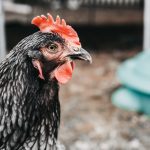Chickens, like all animals, have specific needs that must be met for optimal health and well-being, particularly during winter. These needs include warmth, protection from harsh weather, and constant access to fresh water. Winter conditions can make chickens more vulnerable to illness and stress, necessitating increased care and attention.
During colder months, chickens require additional energy to maintain their body temperature. This often means providing extra food to help them stay warm and maintain their energy levels. A balanced diet is crucial for their overall health and egg production.
While chickens have some natural adaptations to cold weather, they still need proper care in winter. Their coop should be warm, dry, and well-ventilated to protect them from wind, rain, and snow. Ensuring access to unfrozen water is critical, as dehydration can be a serious risk in cold conditions.
By understanding and addressing these specific winter requirements, chicken owners can help ensure their flock remains healthy, comfortable, and productive throughout the colder months. Regular monitoring and adjustments to care routines may be necessary as weather conditions change.
Table of Contents
- 1 Providing proper shelter for chickens
- 2 Insulating the chicken coop
- 3 Using heat lamps or heaters
- 4 Providing extra bedding for warmth
- 5 Ensuring access to fresh water
- 6 Monitoring the health of chickens in winter
- 7 FAQs
- 7.1 What are the best ways to keep live chickens warm in winter?
- 7.2 How can I insulate my chicken coop for winter?
- 7.3 Are heat lamps safe for keeping chickens warm in winter?
- 7.4 What temperature is too cold for chickens in winter?
- 7.5 How can I prevent moisture buildup in the chicken coop during winter?
Key Takeaways
- Chickens need extra care in winter due to their susceptibility to cold temperatures
- Proper shelter for chickens should be dry, draft-free, and well-ventilated
- Insulating the chicken coop with materials like straw or hay can help retain heat
- Heat lamps or heaters can be used to provide additional warmth, but should be used with caution to prevent fires
- Adding extra bedding such as straw or wood shavings can help keep chickens warm and dry
- Ensuring access to fresh, unfrozen water is crucial for the health of chickens in winter
- Regularly monitoring the health of chickens for signs of cold stress or illness is important for their well-being
Providing proper shelter for chickens
Key Features of a Winter-Ready Coop
The coop should be insulated and draft-free, with adequate ventilation to prevent moisture buildup. It’s also important to ensure that the coop is clean and dry, as damp conditions can lead to health issues for chickens. Additionally, the coop should be spacious enough to allow the chickens to move around comfortably and provide roosting space for them to rest at night.
Why a Well-Insulated Coop Matters
When it comes to providing proper shelter for chickens in winter, there are a few key factors to consider. First and foremost, the chicken coop should be well-insulated and draft-free to protect the flock from cold temperatures and harsh weather conditions. Adequate ventilation is also important to prevent moisture buildup, which can lead to respiratory issues for chickens.
Additional Tips for a Healthy Flock
Additionally, the coop should be kept clean and dry to prevent the spread of disease and ensure the overall health of the flock. Providing enough space for the chickens to move around comfortably and roosting space for them to rest at night is also crucial for their well-being during the winter months. By providing a secure and comfortable shelter, you can help your chickens stay warm and healthy throughout the winter.
Insulating the chicken coop

Insulating the chicken coop is an important step in preparing for winter. Proper insulation will help maintain a comfortable temperature inside the coop and protect the chickens from extreme cold. There are several ways to insulate a chicken coop, including adding insulation material to the walls, ceiling, and floor.
It’s also important to seal any gaps or cracks in the coop to prevent drafts and heat loss. By insulating the coop, you can help keep your chickens warm and comfortable throughout the winter. Insulating the chicken coop is crucial for maintaining a comfortable environment for your flock during the winter months.
Proper insulation helps regulate the temperature inside the coop, keeping it warm and cozy for the chickens. This can be achieved by adding insulation material to the walls, ceiling, and floor of the coop. It’s also important to seal any gaps or cracks in the coop to prevent drafts and heat loss.
By insulating the coop, you can help protect your chickens from extreme cold and ensure their well-being throughout the winter.
Using heat lamps or heaters
In some cases, using heat lamps or heaters may be necessary to provide additional warmth for your chickens during the winter months. Heat lamps can be hung in the coop to provide a source of heat, while heaters can be used to warm the air inside the coop. It’s important to use these heating devices with caution, as they can pose a fire hazard if not used properly.
Additionally, it’s essential to monitor the temperature inside the coop and adjust the heating devices as needed to ensure that it stays within a safe range for the chickens. By using heat lamps or heaters when necessary, you can help keep your chickens warm and comfortable during the winter. When temperatures drop significantly, using heat lamps or heaters may be necessary to provide additional warmth for your chickens during the winter months.
Heat lamps can be hung in the coop to provide a source of heat, while heaters can be used to warm the air inside the coop. It’s important to use these heating devices with caution, as they can pose a fire hazard if not used properly. Additionally, it’s essential to monitor the temperature inside the coop and adjust the heating devices as needed to ensure that it stays within a safe range for the chickens.
By using heat lamps or heaters when necessary, you can help keep your chickens warm and comfortable during the winter.
Providing extra bedding for warmth
Providing extra bedding for your chickens is another way to help keep them warm during the winter months. Bedding such as straw or wood shavings can provide insulation and help retain heat inside the coop. It’s important to regularly clean and replace the bedding to keep it dry and free of mold or bacteria.
Additionally, providing nesting boxes filled with clean bedding can give your hens a warm and cozy place to lay their eggs. By providing extra bedding for warmth, you can help ensure that your chickens stay comfortable and healthy throughout the winter. During the winter months, providing extra bedding for your chickens is essential for keeping them warm and comfortable.
Bedding such as straw or wood shavings can provide insulation and help retain heat inside the coop. It’s important to regularly clean and replace the bedding to keep it dry and free of mold or bacteria. Additionally, providing nesting boxes filled with clean bedding can give your hens a warm and cozy place to lay their eggs.
By providing extra bedding for warmth, you can help ensure that your chickens stay comfortable and healthy throughout the winter.
Ensuring access to fresh water

Preventing Water Freezing
In cold weather, water sources can freeze quickly, so it’s important to check on them regularly and provide fresh water multiple times a day if necessary. Using heated waterers or adding a small amount of apple cider vinegar to their water can help prevent freezing.
Maintaining Clean Water Containers
It’s also important to keep water containers clean and free of debris to prevent contamination. This will help ensure that the water remains fresh and safe for your chickens to drink.
Keeping Chickens Hydrated and Healthy
By ensuring access to fresh water, you can help keep your chickens hydrated and healthy throughout the winter. This is essential for their overall well-being and will help them thrive during the cold winter months.
Monitoring the health of chickens in winter
Monitoring the health of your chickens is important year-round, but it’s especially crucial during the winter months when they are more susceptible to illness and stress. Keep an eye out for signs of illness such as lethargy, decreased appetite, or unusual behavior. It’s also important to regularly check on their feet and combs for signs of frostbite, which can occur in extremely cold temperatures.
Providing a balanced diet with plenty of nutrients can help support their immune system and overall health during this time. By monitoring their health closely and addressing any issues promptly, you can help ensure that your chickens stay healthy throughout the winter. Keeping a close eye on the health of your chickens is essential during the winter months when they are more susceptible to illness and stress.
Look out for signs of illness such as lethargy, decreased appetite, or unusual behavior. It’s also important to regularly check on their feet and combs for signs of frostbite, which can occur in extremely cold temperatures. Providing a balanced diet with plenty of nutrients can help support their immune system and overall health during this time.
By monitoring their health closely and addressing any issues promptly, you can help ensure that your chickens stay healthy throughout the winter. In conclusion, understanding and addressing the needs of chickens in winter is essential for their health and well-being during this challenging time of year. Providing proper shelter, insulation, warmth, bedding, fresh water, and monitoring their health are all crucial aspects of caring for chickens in winter.
By taking these measures, you can help ensure that your flock stays healthy, comfortable, and happy throughout the colder months.
If you’re looking for more information on keeping chickens warm in the winter, you might want to check out this article on turning a shed into a chicken coop. It offers helpful tips on creating a cozy and insulated space for your feathered friends to stay warm during the colder months.
FAQs
What are the best ways to keep live chickens warm in winter?
Some of the best ways to keep live chickens warm in winter include providing a well-insulated coop, using heat lamps or heated pads, and ensuring proper ventilation to prevent moisture buildup.
How can I insulate my chicken coop for winter?
You can insulate your chicken coop for winter by adding extra bedding, sealing any drafts, and using insulating materials such as foam board or straw bales. It’s important to ensure that the coop remains well-ventilated despite the insulation.
Are heat lamps safe for keeping chickens warm in winter?
Heat lamps can be safe for keeping chickens warm in winter if they are used properly and securely installed. It’s important to follow safety guidelines and to monitor the temperature in the coop to prevent overheating or fire hazards.
What temperature is too cold for chickens in winter?
Chickens can tolerate cold temperatures, but they are susceptible to frostbite and other cold-related health issues. It’s generally recommended to keep the coop above freezing, ideally around 45-50 degrees Fahrenheit, to ensure the chickens’ well-being.
How can I prevent moisture buildup in the chicken coop during winter?
To prevent moisture buildup in the chicken coop during winter, it’s important to ensure proper ventilation and to use bedding materials that absorb moisture. Additionally, minimizing water spillage and keeping the coop clean can help prevent excess moisture.
Meet Walter, the feathered-friend fanatic of Florida! Nestled in the sunshine state, Walter struts through life with his feathered companions, clucking his way to happiness. With a coop that’s fancier than a five-star hotel, he’s the Don Juan of the chicken world. When he’s not teaching his hens to do the cha-cha, you’ll find him in a heated debate with his prized rooster, Sir Clucks-a-Lot. Walter’s poultry passion is no yolk; he’s the sunny-side-up guy you never knew you needed in your flock of friends!







